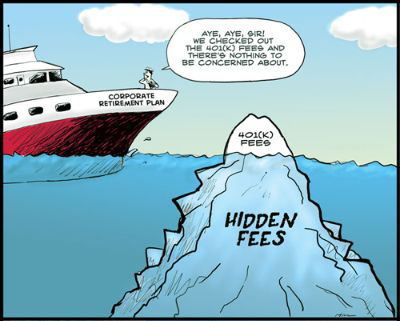
As a business owner, you want to do what is best for your employees. Setting up a retirement plan is a great way to show your appreciation for all their hard work. More often than not, business owners treat employees like family and they only want what is best for them.
Once you decide to sponsor a retirement plan for your employees, you need to understand that, unlike investing for yourself and your family, YOU ARE NOW A FIDUCIARY and it means that you have a legal obligation to the plan and its participants. Once you set up the company's 401(k) plan, you become the plan sponsor and the “Named Fiduciary”. Investment returns cannot be the only factor for choosing your plan's investment lineup.
You have a fiduciary duty to the plan participants, which is the highest duty of care under ERSIA. As the plan sponsor, you can take steps to minimize liability, but you can never fully eliminate it.
You can minimize liability by:
- Purchasing fiduciary liability insurance
- Participating in multiple employer plan
- Hiring an ERISA §3(16) fiduciary who assumes the “administrator” roll
- Hiring an ERISA §3(21) fiduciary who provides non-discretionary investment advice
- Hiring an ERISA §3(38) fiduciary who assumes the Investment Manager roll

None of these actions fully eliminate a plan sponsor’s liability for the fiduciary process because selecting any of these fiduciaries is in itself a fiduciary function. You must oversee the fiduciary you hire. If they are negligent in their duties, then you have failed in your fiduciary duties. So while you could put pieces in place that can help minimize your liability, as the plan sponsor and individual trustees, you can’t fully eliminate it.
MVM does not provide tax, accounting or legal advice.
As the plan sponsor, the best way to limit your liability is to have the correct process in place and then hire the best team to execute on that process.
MVM will help you put together a process that is best for your company and we will work with you to hire a qualified team that is best suited for your company’s needs.
Roles of 401(k) Service Providers
401(k) plans are complex and often difficult to understand due to the number of service providers and regulations required to make a plan run and keep it in compliance – not to mention the long list of industry acronyms that get thrown into 401(k) discussions and documents.
Below are a list of services providers and what they do (not all plans need all providers):
Recordkeeper -- The Recordkeeper is sometimes referred to as your primary 401(k) provider as they are typically the most visible provider on your plan. Their role is to manage and track the data within the 401(k) plan and communicate that data to the other necessary parties. The website where employees log in and payroll data is uploaded is almost always run by your Recordkeeper. Recordkeepers are usually paid a direct annual base fee and per participant fees but can also have asset based fees that are either paid from participant balances or indirectly from the mutual funds in the plan. Typically, you can elect whether recordkeeping fees are paid by the employer, or the employees. Some recordkeepers are also TPA firms as well (see TPA section below). We prefer this so the “data” and “compliance” work is all done under the same roof.
Third Party Administrator (TPA) -- The TPA or “Third Party Administrator” manages most of the plan compliance. As mentioned, some TPA firms are Recordkeepers as well. Compliance work consists of items like preparing your annual 401(k) tax filing (your 5500), managing plan documents, and performing required annual non-discrimination testing on the plan. While they typically bill the company directly, TPA fees can also be paid by plan participants. Their fees usually involve an annual base fee, a per-participant fee, and other a-la-carte services they might provide. We’ve also seen TPA’s charge asset-based fees on occasion which are usually paid directly from participant accounts.
Custodian -- The custodian of a 401k plan is the entity, usually a bank or other financial institution, that has physical control of the contents of the plan. The custodian is responsible for protecting the plan assets from theft and for keeping it secure, but is not entitled to make any decisions regarding the funds. The custodian is obligated to take direction from the trustee in terms of releasing money for investments or other authorized transactions. They move funds from the company’s bank account into the individual investment accounts as they receive instructions from the recordkeeper based on what the participants and sponsor have elected. You don’t usually have significant interaction with this service provider other than opening a custodial account and giving them permission to pull (ACH) funds from your company account. They are typically paid a small asset based fee which can be billed directly or deducted from participant accounts.
Financial Advisor / Broker -- The financial advisor on your plan is the registered and licensed professional who has the responsibility to provide investment advice to employees. Not all 401(k) plans have a financial advisor, but many do and they can be a great resource for employees and your internal investment committee. In most cases they should be running your enrollment meetings and helping with investment education. Most financial advisors receive an asset-based fee that is paid directly from participant accounts and/or indirectly from the mutual funds in the plan.
Auditor -- Not all plans have or need a 401(k) auditor. You are only required to perform an annual audit on your 401(k) plan if you have over 100 eligible participants. If you do require an audit, the auditor is typically a local accounting firm that has experience in this space. You are also not required to use the same auditor each year though it can often save you costs and create efficiencies when you work with the same firm. Audit costs are typically billed directly to the plan sponsor though they can also be paid by participants or forfeitures if there are enough to effectively cover the cost.
ERISA Attorney -- Not all companies use an ERISA attorney on their 401(k) plan. In many cases, they simply trust that their TPA and Recordkeeper have a capable attorney that is reviewing and monitoring plan documents and procedures. Unfortunately, if those parties don’t have a capable attorney and you adopt a plan document that has issues, it’s usually you (the plan sponsor), that is legally responsible for the consequences. Before proceeding without an ERISA attorney, you should ask your providers if documents have been reviewed and approved by an ERISA attorney. In many cases they can even show you an IRS determination letter certifying the veracity and compliant nature of the document. Should you decide to use an outside ERISA attorney for a plan or document review, they typically bill hourly and the good ones don’t come cheap.
Fiduciary -- In general, a 401(k) plan fiduciary is someone that has legal responsibility to act in the sole interest of your employees. One of their primary jobs is to select, monitor, and benchmark the service providers on the plan. Despite what you may think, in most cases, the service providers mentioned above and below are not actually plan fiduciaries. They are just service providers. And while they do significant work on the plan, they are rarely held responsible when it comes to 401(k) lawsuits or audits by government entities. In most 401(k) plans, the plan sponsor carries all of the administrative and investment fiduciary roles and takes on the risk and work associated with those roles.
